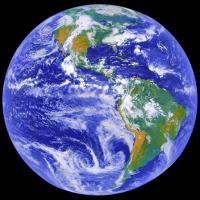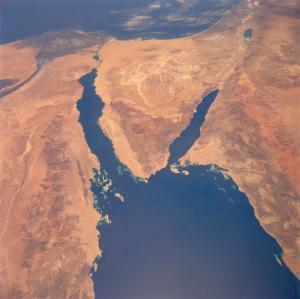The Perspective From Space


One of the most important things to have happened in the last several hundred years is the publication of the photographic images of our planet taken in Space.
One of these - among the first and still impressive - was the image taken on the Apollo 8 lunar mission. This showed Earthrise as seen from the vicinity of our natural satellite, the Moon. Another impressive, beautiful, photograph was taken on the Apollo 11 mission.
Subsequent images from Earth-orbiting man-made satellites have mapped our planet in considerable detail.
What is important about these images is that they place us where we truely belong: on one planet, orbiting a star which is but one star of millions upon millions of stars in a galaxy which is but one galaxy among millions upon millions of galaxies in the cosmos.
That is, these images of our Earth give us a new cosmic perspective on our own lives, on our own problems, just as they show how small we are, and how small our own planet is. In particular, they can and should cause us to consider how we fit-in with the other human beings, and the other life, with which we share this planet.
These images can and should reveal to us our humanity, as they can and should inform us of how petty, how childish, we are being when we are arrogant toward and indifferent to other human beings, and other life, on this planet which is our home.
These images can and should reveal to us how we should change our own behaviour, our own attitudes, our own thoughts, by growing up: by taking the next leap forward in our evolution, as human beings.
For thousands upon thousands of years we human beings have concerned ourselves with our own feelings, our own personal desires, our own personal needs, our own personal feelings and feuds. At best, we have put the interests of our own family, our own tribe, our own clan - and latterly - our own "nations" before ourselves, but only to squabble among ourselves.
That is, we have carried our animal ancestry around with us: squabbling among ourselves like savage or half-savage animals. Today, the objects of our squabbling may have changed, a little, but we still for the most part squabble like children. Occasionally, we may actually try to be human, and try to solve our problems through reason, through negotiation, but if this fails, we just resort to squabbling again, with weapons far more powerful than clubs. One nation, one person, always has to try to be "top dog" (today, America) and always, in the end, ends up using the threat of force to get their own way: that is, they always in the end use the tactics of the bully, of the savage.
And what is truely appalling is that even the vast majority of the few problems which we attempt to solve through reason, through negotiation, are about petty, stupid, unimportant things, when seen from a human perspective, when seen from the perspective from Space. The concerns are mostly about wealth, about power, about resources, and it is all so incredibly stupid and childish. And tragic and sad, because we have the ability, the capacity, the knowledge now, to rise above all this and act like honourable, dignified, rational, human beings: that is, as beings who live on a daily basis according to the human qualities of fairness, reason, honour, and tolerance, and who actually use the knowledge, the understanding, we have accumulated through thousands of years of civilization.
On a personal level, I can remember being in Egypt early in the last decade of what in the West was called the twentieth century. I remember my own thoughts, my own concerns, as I remember the people around me, carrying on with their daily lives. And I can remember seeing, not long after, a photographic image of the area, taken from Space [reproduced below] while I myself was in the area.

And where, in this image, am I? Where are the people I met? I may well have a very high opinion of myself, and consider my own life interesting, and perhaps important, as often I will be consumed with my own personal concerns which feel very important to me. But in the larger perspective of all the people who were around me at that time, when, overhead a spacecraft was taking photographic images of the area, and in the even larger perspective of the entire Earth, of our own rather small Galaxy, what do my own concerns mean? What does my own life mean?
Shall I be just another one of the millions upon millions of living things which flourished, briefly, upon a planet, but who contributed nothing positive, and long-lasting? Who merely lived, and survived, as animals live and survive?
Or shall I strive to be a human being: someone who by being human, by using reason, by being fair, honourable, just and tolerant, helped the progress of all life and perhaps contributed something positive and long-lasting; someone who made some contribution, however small, to the upward, evolutionary, development of life?
What is important about us, as human beings, is that we do possess the capacity to reason, to act honourably, as we do possess the capacity, the capability, to change ourselves purely by an act of personal will. Other life on this planet does not have this option: such life cannot change itself, it can only adapt to changed circumstances.
The truth is we human beings have the capacity to change this world, through our deeds, our way of life, in either a good way, or a bad way. So far, we have changed the world in a bad way: carrying on being savages (at best, half-savages), rapaciously devouring the resources of the planet, and stupidly and selfishly destroying through our pollution and our way of living, the balance of life itself, and all too often other living beings.
The tragedy, the sadness, is that it does not have to be like this. We have the ability, and now the knowledge, to behave, to live, in a different way.
This knowledge is the wisdom of Folk Culture.
David Myatt